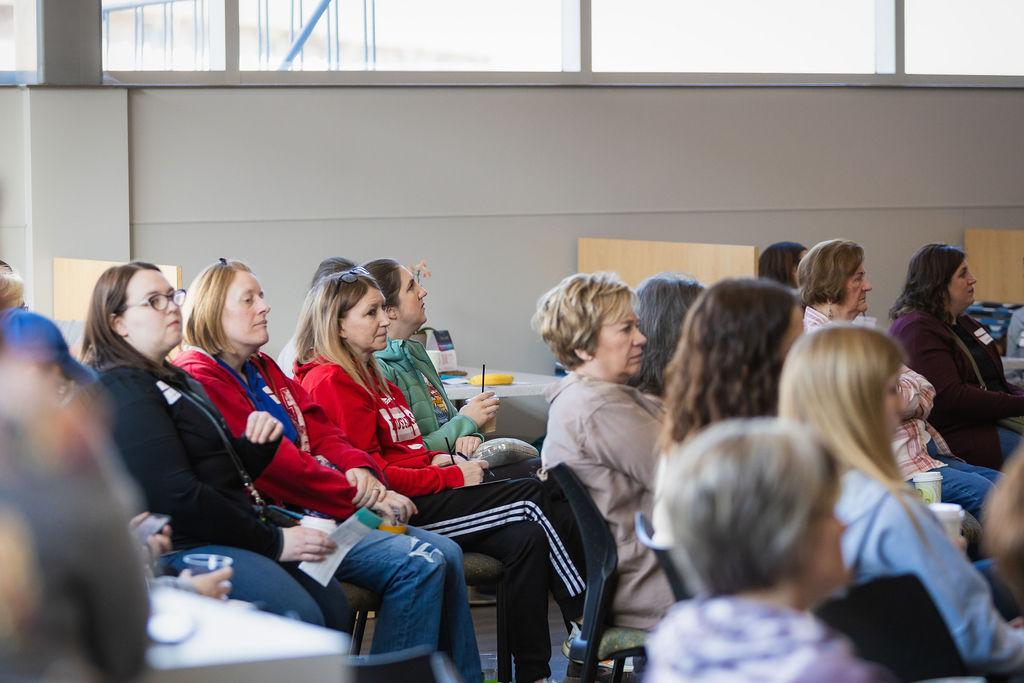
Women Connect
Skin Health Simplified | Resources
To ensure you have this important information right at your fingertips, we're providing eco-friendly online resources from our Women Connect skin health event.
Click to open our Skin Health Simplified photo gallery.

Skin Health Simplified Q&A: Top 5 Questions
-
Tomas Huerta, MD: "I think a great place to start for the majority of people is cleansing twice a day with something gentle because you don't want to dry out your skin for the sake of keeping it clean.
"In the morning, you put on a moisturizer with an SPF of 30. That's kind of the magic number. At SPF of 15, you're blocking 93% of the sun's rays. At SPF 30, you hit that 97%. So that's really what the American Academy of Dermatology recommends. So cleanse and then moisturize and protect in the morning. If you're wearing makeup that day, you put that on over the moisturizer and you go about your business.
"Then at night, I would cleanse again and moisturize again. That's a great time to work in a moisturizer that has niacinamide (a form of Vitamin B3) or Vitamin C. Those are great ingredients to get on your skin that can reduce inflammation, cause a lightening effect or improve the texture of your skin.
"So, I say cleanse twice a day, moisturize and protect in the morning, moisturize at night. That's what I would recommend for a very basic skin routine that should help pretty much anybody."
Susan Caniglia, MSN, APRN: "Botox is very safe. Cosmetically, it's been around for over 20 years now. It is also used for medical reasons, so it has a lot of research behind it. I always tell my patients the good and the bad thing about Botox is that it wears off. So if you didn't like it, it's going to wear off. But most people come back for their second dose because it's a really safe medication.
"I would just recommend seeing a provider that has been trained. Botox treatments are tailored to each person. Everybody's different on units and what they're looking for. It kind of gets a bad rap because you see some very overdone people on TV, but Botox is usually more natural-looking. You still look like 'you,' your lines just start to fade away."
Tomas Huerta, MD: "With this latest TikTok Trend, you have more adolescents paying attention to their skin at an earlier age, which I think is a good thing overall. But by making skin care products a commodity — almost like collecting trading cards — you can run into problems. Fortunately, I think with most of these skin care products, the worst thing that's going to happen would be a lot of irritation to the skin.
"If you have a child on TikTok that's getting interested in skin care, you could always say, 'Why don't we go talk to a medical provider about this and let them guide you?' I think the pediatrician or primary care provider for the child is a great place to start.
"But, overall, it's a positive to start taking care of your skin at a young age. Younger children should avoid retinoids, but a good cleanser that doesn't dry out your face too much, a quality sunscreen (with an SPF of 30) and moisturizer are great things."
Tomas Huerta, MD: "Acne can affect people of all ages. There are great over-the-counter products like CeraVe, Cetaphil and Neutrogena. Some of the downfalls I see, especially with younger patients: they try hard to scrub away their acne using these exfoliating pads, and they can almost overdo it.
"In trying to treat your acne, you don't want to stress out your skin. It's just going to make things worse. We want to go back to some of those basics: a good acne wash with benzoyl peroxide or a mild retinoid. Those can be a great start. If you know somebody that's having scarring or dark spots from their acne, that patient should see a dermatologist because those can have lasting effects."
Tomas Huerta, MD: "Hair thinning/hair loss is a big part of my practice. Most of the hair experts out there are dermatologists. That's probably where I would start if you have a concern. There are a lot of different types of hair loss. We put it into two categories: scarring and non-scarring. With scarring hair loss, what you lose you can't get back. With non-scarring, some hair can come out, but then it can grow back.
"This is another space where supplement companies and over-the-counter products saw an opportunity because most of us are pretty passionate about our hair. It can have a pretty big psychological effect if you notice changes. There are some good products and some not-so-good products. If you want to make a difference, probably the best place to start would be with different prescription strength medications, which is something a dermatologist can help with."
The Sun & Our Skin: More of Your Questions Answered
Methodist dermatologist Dr. Tomas Huerta is here to help us avoid the dark side of the sun. You have questions about sunscreen, sunburns and skin cancer. Dr. Huerta has the answers for us in a series of question-and-answer videos.
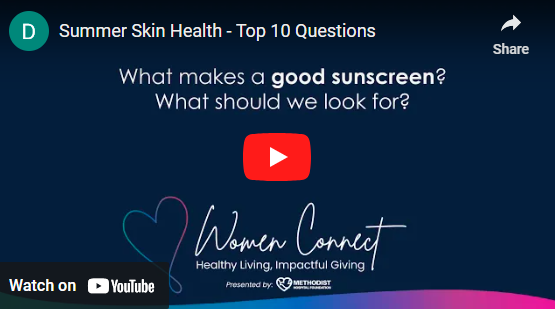
Conducting a Self Skin Check and the ABCDEs of Melanoma
Skin cancer is the most common cancer in the United States, according to the American Academy of Dermatology. Early detection is key to successful treatment. When caught early, the 5-year survival rate for melanoma is 99 percent.
We can take action to protect our health by performing regular skin self-exams. The resource below will help get you started and guide you on what to look for.
Click to download the information.
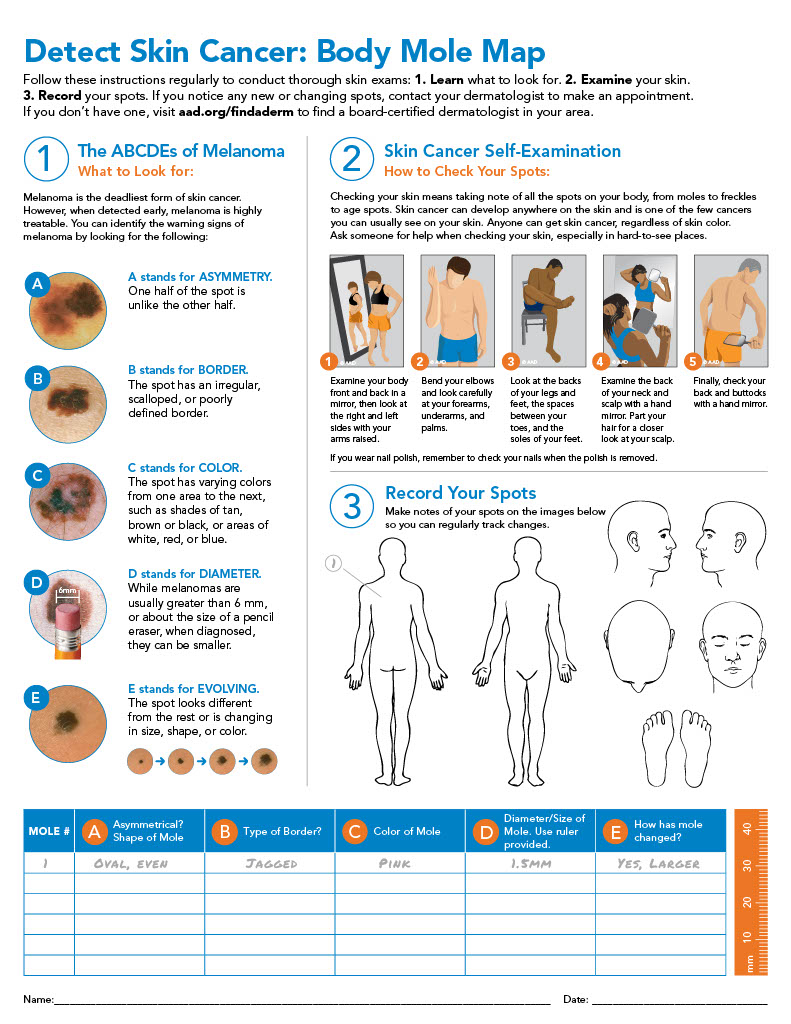
Need to Schedule an Expert Skin Check or Follow-up Visit?
Our Methodist experts were able to provide skin spot checks to more than 60 women at our skin health event.
- If you need to schedule a follow-up visit, call (402)354-0621 or visit https://bestcare.org/specialties/dermatology.
- If you did not receive a slot for a free check, consider scheduling an appointment with a Methodist dermatologist using your insurance.
We will also keep you posted if Methodist providers schedule any additional no-charge, community screenings.
Interested in Skin Renewal Services?
It’s easier than ever to renew your skin’s health and appearance. Methodist's Skin Renewal team can help reduce fine lines and wrinkles, remove unwanted hair, tighten and firm skin, diminish the look of skin discoloration and spider veins, and more.
Download the Skin Renewal Suite's menu of services.
Call (402) 815-NEW-U (6398) to schedule your appointment or visit BestCare.org/SkinRenewal.
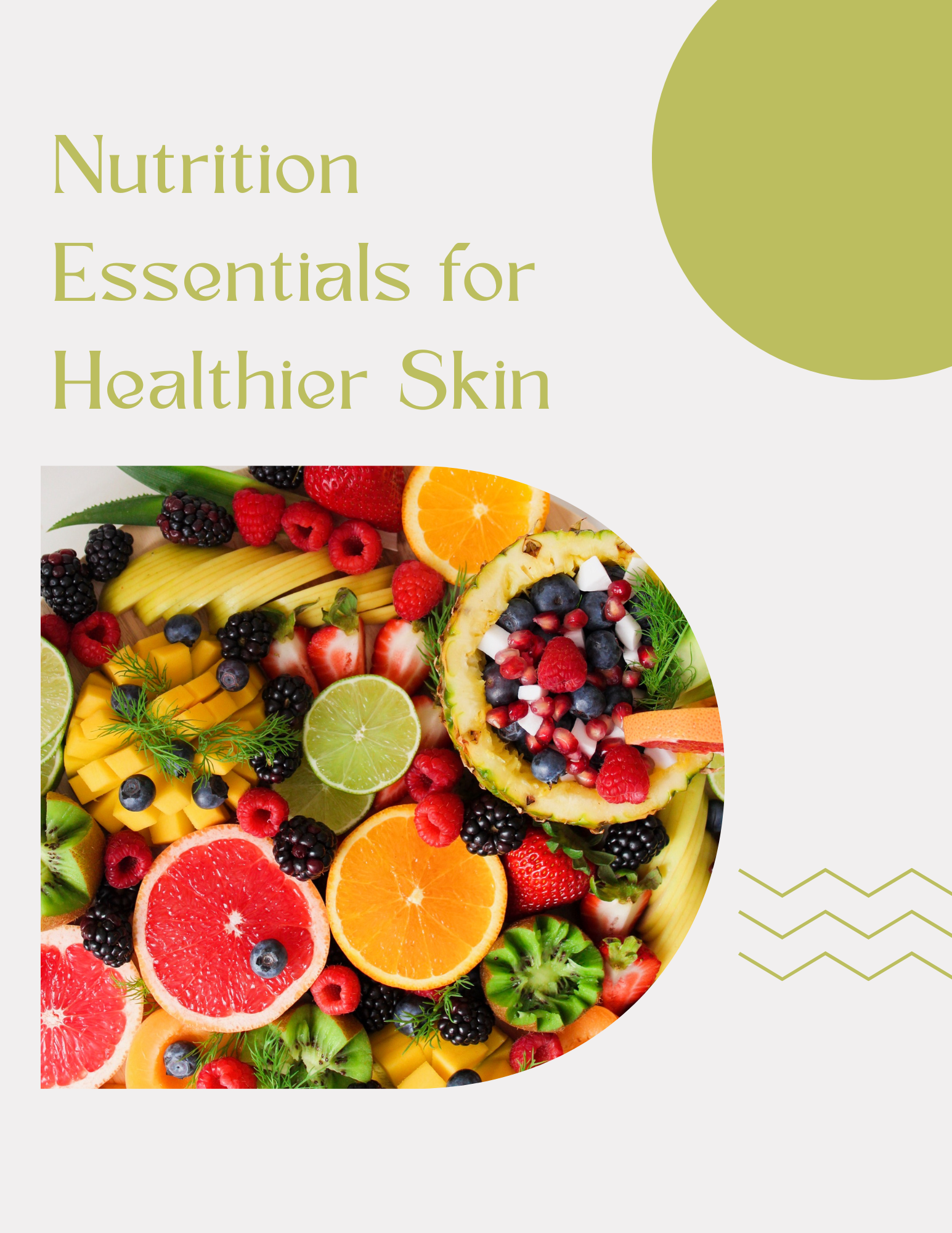
Nutrition Essentials for Healthier Skin
Our skin is a reflection of our overall health, and diet is an essential part of that.
Dr. Huerta recommends following a Mediterranean diet. It can help with inflammation and moisture problems in your skin.
A Mediterranean diet is high in antioxidants. It emphasizes healthy fats, whole grains, fruits and vegetables.
Check the resources below for additional information: nutrition essentials for healthier skin provided by Methodist dietitian Deborah Willcox, RD.
Plus, you'll find recipes for the skin-fortifying foods we served at our skin health event.
Diet & Skin Health
-
- Eggs are a good source of protein and biotin, which help prevent dry skin.
- Salmon is rich in omega-3 fatty acids, which helps keep skin thick, supple and moisturized.
- Eat plenty of fruits, vegetables and seeds. Fiber helps with gut health. When our gut is healthy, our skin can function at its best.
- Eat more plant-based foods and avoid high amounts of red meat.
- Low salt intake is important. Salty foods promote dehydration, which can pull moisture out of your skin.
Source: Methodist dietitian Deborah Willcox, RD
- Avoid fat-free dairy products. Cow’s milk, particularly skim milk, is associated with acne breakouts.
- Stay away from processed foods. Following the Mediterranean diet can help with inflammation and moisture problems in your skin.
- Limit added sugars in foods and sugary beverages. Spikes in blood sugar release higher levels of the hormone insulin-growth factor, which activates oil glands and increases pimples.
- Watch salt intake. High salt levels can lead to bloating and fluid retention, which contributes to puffiness under the eyes.
- Limit alcohol. It acts like a toxin and promotes inflammation.
Source: Methodist dietitian Deborah Willcox, RD
Skin-Healthy Recipes from Our Women Connect Event
-
ROASTED GARLIC HUMMUS - 8 servings
Ingredients:
2 cups drained well-cooked or canned chickpeas, cooking liquid reserved if possible
½ cup tahini
1 zest of lemon & its juice
6 cloves of roasted garlic
¼ cup olive oil
1 tsp. kosher salt (add more to taste if needed)
1 tsp. white ground pepper
1 Tbs. ground cumin or paprika, or to taste, plus a sprinkle for garnish
Preparation:
1. Combine chickpeas, tahini, lemon juice, zest, garlic, spices, white pepper and salt in a food processor.
2. With the motor running, slowly drizzle in the olive oil and blend until smooth.
3. Taste and adjust seasoning as needed. Adding more oil, lemon juice, garlic and salt as needed.
4. Serve in a bowl and sprinkle with parsley or a nice sea saltIf you do not have a food processor, a blender would work.
To roast garlic, place garlic cloves in a small saucepan and just barely cover with olive oil.
Place on stove on medium heat, and cook until the cloves become tender and golden in color.
Strain garlic and use the oil to give the hummus a more intense garlic flavor.
Health Benefits:
Chickpeas have folate, which supports collagen production. Studies have shown that folate supplementation can reduce the risk of squamous cell carcinoma by up to 50%. This is the second most common type of skin cancer of the head and neck.
Cumin includes anti-bacterial, anti-microbial, and anti-inflammatory properties.
BEET HUMMUS - 8 servings
Ingredients:
2 beets cleaned and roasted
2/3cup tahini
2-3 zest of lemons & their juice
2 cloves garlic chopped
1/3 cup olive oil
1 tsp, kosher salt (add more to taste if needed)
1 handful of fresh herbs (thyme, rosemary, basil, etc.)
Preparation:1. Combine beets, tahini, lemon juice, zest, garlic, herbs and salt in a food processor.
2. With the motor running, slowly drizzle in the olive oil and blend until smooth.
3. Taste and adjust seasoning as needed. Adding more oil, lemon juice, garlic and salt as needed.
4. Serve in a bowl and sprinkle with parsley, pine nuts or a nice sea salt.If you don’t have a food processor, a blender would work.
To roast beets, wash and coat with oil and salt, wrap in foil, and place in a 400-degree oven for an hour (until they are fork tender). Wait for them to cool then peel the skin off.
Health Benefits:
Beets help fight skin pigmentation and dark circles. They also aid with a healthy complexion.
Tahini is high in omega-3 and omega-6 fatty acids, which can help reduce inflammation and improve hydration.
BLUEBERRY BANANA OVERNIGHT OATS - 1 Serving
Ingredients:
½ cup sweetened almond milk
½ cup old-fashioned oats
½ tbs. chia seeds
½ banana, mashed
1 tsp. maple syrup
Pinch of salt
½ cup fresh blueberries
Preparation:
Combine almond milk, oats, chia seeds, banana, maple syrup and salt in a pint-sized jar and stir. Top with blueberries. Cover and refrigerate overnight.
Health Benefits:
Almond milk contains vitamin D, which helps reduce inflammation and protect the skin against sun damage.
Old-fashioned oats and chia seeds are a great source of fiber, which supports the body’s gastrointestinal health. When our gut is healthy, our skin can function at its best.
Impactful Giving
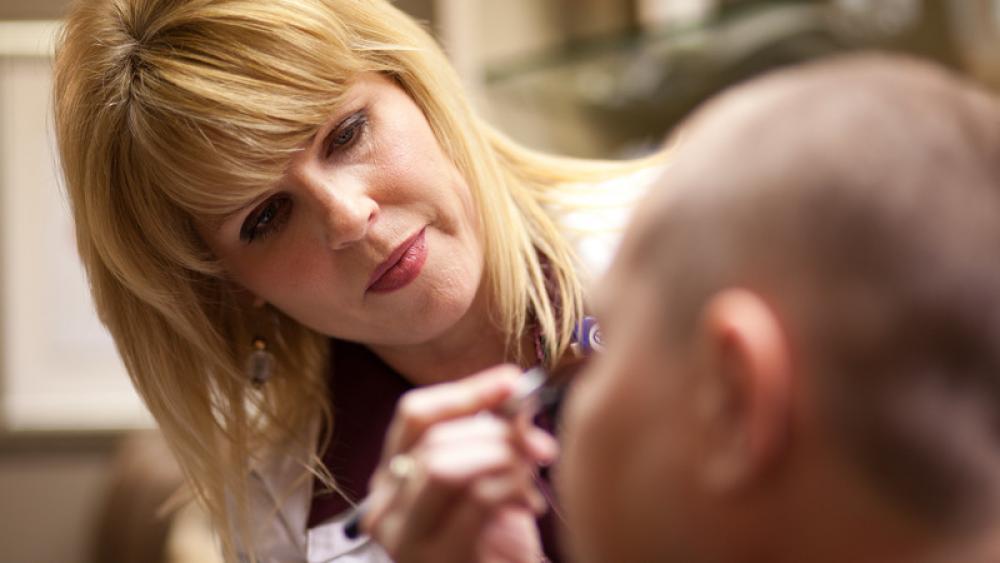
Help Cancer Survivors Find Inner Peace and Inner Confidence. Support Inner Beauty, a specialty salon at Methodist Estabrook Cancer Center.
Every gift you make – any size – will help cancer survivors.
Here are a few examples:
• Emu oil (hydrates skin damaged by radiation, reduces inflammation) | $30
• Chemo beanies/hats | $30–$35
• Mastectomy bras | $70
• Prosthesis | $450
• Wigs | $185–$600
Donate Today
Have a friend or family member who would be interested in Women Connect?
Please forward this link so they can learn more: MethodistHospitalFoundation.org/WomenConnect
